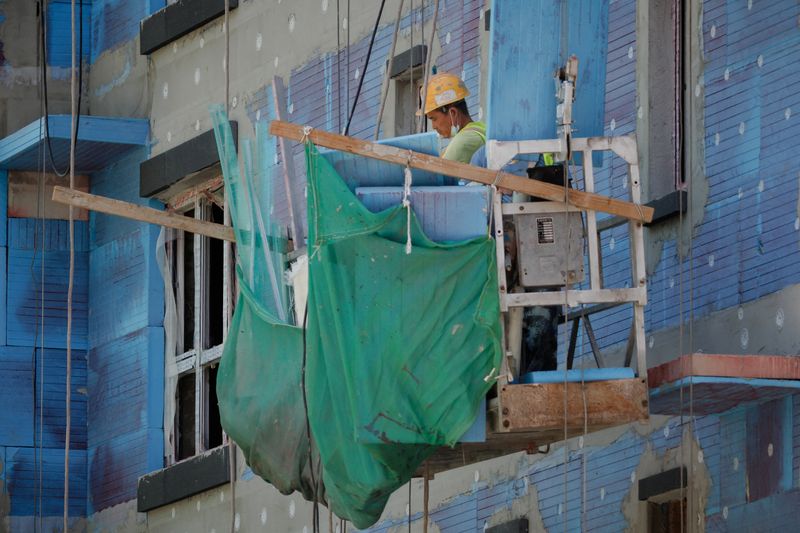By Clare Jim
HONG KONG (Reuters) -Shanghai-based property developer CIFI Holdings said on Tuesday it has suspended payments on all of its offshore debt after it failed to reach an agreement with creditors to which it owes $414 million in total.
CIFI said in a filing it has engaged Haitong International Securities Company Limited as financial advisor and Linklaters as legal adviser to facilitate a restructuring of its $6.85 billion offshore debt, as it is likely to come under continued pressure to generate sufficient cash for repayments.
The company’s shares plunged 26% following the lifting of a trade suspension that had been in place since Thursday.
CIFI’s default is another blow to a deepening debt crisis in the sector, following the resignation of Longfor Group’s chairwoman and state-backed Greenland Holdings’ request to extend some offshore bond repayments on Monday.
CIFI and Longfor had borrowings totalling 114 billion yuan ($15.61 billion) and 212 billion yuan, respectively, as of June, and Greenland had 122 billion yuan.
While Beijing-based Longfor has not run into liquidity problems, the three companies were considered safer bets previously due to the state support on their financing.
These events are likely to worsen investor concerns about China’s property sector at a time when already weak sales are likely to be weighed by fresh COVID lockdowns across the country.
Longfor recovered 7.8% by early afternoon after plummeting 24% on Monday, while Shanghai-listed Greenland dropped 1.1%. Hong Kong’s broader Hang Seng Mainland Properties Index rose 2.9% while China’s CSI300 real-estate sub-index fell 1.1%.
WORSENING CONDITIONS
In the Tuesday filing, CIFI said the failure to meet offshore debt obligations was because of a further deterioration in sales and credit availability and heightened payment pressure triggered by a ratings downgrade.
Greenland also blamed declining property sales and the overall economy, as well as rising U.S. interest rates for its inability to repay on time, according to a transcript of the firm’s Monday meeting with creditors seen by Reuters.
“Until now we don’t’ see any turning point for sales of the whole industry,” said a senior executive of Greenland. “Although every city is relaxing rules and has encouraging policies, from the front line we feel it’s not optimistic.”
The executive also said while state shareholders including the Shanghai government and State-owned Assets Supervision and Administration Commission Of Shanghai Municipal Government have supported offshore repayments in the past, the firm’s “extreme situation” now required a market resolution.
Greenland declined to comment.
S&P Global Rating director Edward Chan said the market is disappointed after CIFI and Greenland’s event as there were hopes that they could make repayments. The rating agency withdrew its rating on CIFI last month.
“According to (CIFI’s) disclosures in the past it seemed they still had cash in hand…so is this a problem of willingness or a problem of capacity (to repay)?” Chan said.
“I think it’s a question mark: a lot of the investors are doubting that. This would weaken investor confidence further.”
Regarding developers generally, he said the market is monitoring closely if there would be further weakening in buyer confidence and whether existing financing channels could be maintained.
CIFI said in its filing its offshore debt problems do not materially affect onshore financing arrangements as a whole and that commercial operations remain normal.
($1 = 7.3040 Chinese yuan)
(Reporting by Clare Jim; Editing by Kim Coghill and Sam Holmes)


